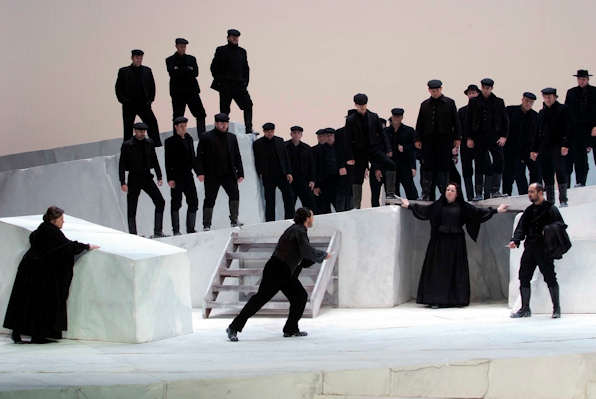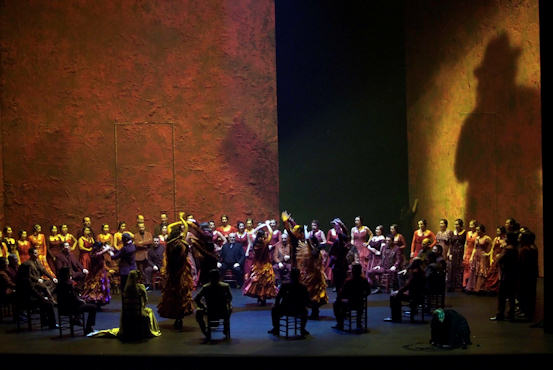Other Links
Editorial Board
-
Editor - Bill Kenny
Assistant Webmaster - Stan Metzger - Founder - Len Mullenger
Google Site Search
SEEN AND HEARD INTERNATIONAL OPERA REVIEW
De Falla, La Vida Breve and Mascagni, Cavalleria Rusticana:
Soloists, Orquestra de la Comunitat Valenciana. Cor de la Generalitat Valenciana, Conductor: Lorin Maazel., Palau de les Arts de Valencia. 25.03.2010. (JMI)
La Vida Breve
New Production.
Director: Giancarlo del Monaco.
Sets: Giancarlo del Monaco.
Costumes: Jesús Ruiz.
Lighting: Wolfgang Von Zoubek.
Choreography: Goyo Montero.
Cast:
Salud: Cristina Gallardo-Domas.
Paco: Jorge de León.
Grand Mother: María Luisa Corbacho.
Uncle Sarvaor: Felipe Bou.
Forge’s Voice: Antonio Lozano.
Carmela: Sandra Ferrández.
Manuel: Isaac Galan.
Cantaora: Esperanza Fernández.
Guitarrista: Juan Carlos Gómez Pastor.
Cavallería Rusticana
Production from Madrid Teatro Real.
Director: Giancarlo del Monaco.
Sets: Johannes Leiacker.
Costumes: Birgit Wentsch.
Lighting: Wolfgang Von Zoubeck.
Cast:
Turiddu: Jorge de León.
Santuzza: Anna Smirnova.
Alfio: Gevorg Hakobyan.
Mamma Lucia: María Luisa Corbacho.
Lola: Natalia Lunar.
Picture – La Vida Breve 6 centred here:

Production Picture – La Vida Breve © Taeto Baeza
Valencia offers an unusual double bill, coupling La Vida Breve with Cavalleria Rusticana. These two works are within the verismo period and perfectly complement each other, although there were almost 25 years between their premieres.
Each production bears the signature of Giancarlo del Monaco, La Vida Breve being a new production, which emerges as a surprising and most interesting work. His Cavalleria Rusticana comes from Madrid, where it was premiered three years ago. A month ago we were able to see his very colourful and realistic production of Andrea Chenier in Madrid; now he offers a production that lies at quite the opposite pole. His La Vida Breve production is minimalist, conceptual and intimate based on the protagonists’ love sickness. Thus Del Monaco’s work might be considered Salud’s dream or rather Salud’s nightmare, taking into account her very tragic end. We witness a stage work through the vision of the protagonist, always present on stage, often as a silent witness. The del Monaco sets comprise mobile walls that create a remarkably oppressive atmosphere. Costumes are always black for gypsies, and even the dancers wear rather pale-coloured dresses, as seen through the eyes of poor insane Salud (‘Health’ in Spanish). Lighting contributes perfectly to complete this dark and mostly phantasmagorical atmosphere. Giancarlo del Monaco’s direction is at the service of the insane and truly pessimistic vision of the protagonist. Here even the flamenco singer (la cantaora) appears as a victim of crucifixion. This is perhaps the more debatable and least successful aspect of the production. It was a very interesting, original and personal vision of de Falla’s opera.

Production Picture – Cavallería Rusticana © Taeto Baeza
Cavalleria Rusticana was not at the same level of quality. The production is based on the contrast of colours, white for sets consisting of big marble blocks, and black for costumes. Del Monaco’s direction is good, offering the fight between Turiddu and Alfio, and, giving the last words “Hanno amazzato compare Turiddu” to Mamma Lucia and Santuzza. This works much better than being given to a member of the choir.
Lorin Maazel has been slowing down tempi in the last few years in a very personal way. This focuses interest in the sound that he gets from his magnificent orchestra. I must say that his reading of La Vida Breve was a perfect complement to Del Monaco’s ideas. Maazel offered a most dramatic reading, including all the dancing during the Paco and Carmela wedding. It’s all very personal but whether or not it is truly great it will remain in my memory for a long time. As always under his baton, the orchestra offers a real luxury of sound and discipline.
Maazel decided to slow down tempi yet further in Cavalleria Rusticana. This time the result spoke of personal caprice and did not work at all. It created major problems for the singers. Suffice to say that the opera lasted for 100 minutes - probably a world record. Cavalleria Rusticana is one of the monuments of Verismo, where passion is a fundamental element. Maazel offered a reading that made it more oratorio than opera; as if passion did not exist. There were some splendid moments, such as the Intermezzo and "Inegiamo il Signor non è morto", but there were too many others that were truly exasperating. Particularly incomprehensible were his tempos in “A casa, a casa” taken at a true funereal pace. The singers suffered too much to follow him, particularly Alfio and Santuzza, but the choir were not immune from the effects. Only “Addio a la mamma” resembled what we are used to. I have always praised the music category of Mr. Maazel, but this time his personal vision seems totally out of place.
Chilean soprano Cristina Gallardo-Domas was an excellent Salud, living the character with a remarkable intensity. It is the best performance I have seen from her in the last three years and it is excellent news to see this excellent artist again in good shape. The rest of the characters in La Vida Breve were well cast. Jorge León was good in the part of Paco, Antonio Lozano seemed to be having a hard time singing the Forge song, and María Luisa Corbacho made for an impressive Grandmother, while Felipe Bou was rather weak as Sarvaor. Esperanza Fernández was an excellent cantaora.
An excellent Turiddu came in the shape of Jorge Leon. He not only survived the difficulties of the score, but also Maazel’s tempos. Few tenors these days are able to offer a voice like his. The big question is how he will evolve. If his intelligence is equal to his voice, we have a long and brilliant career ahead. Russian mezzo Anna Smirnova was a powerful Santuzza. Her performance was convincing, although her voice is more impressive in size than in quality. Armenian baritone Gevorg Hakobyan was good in the character of Alfio. He left a positive impression, although it would be welcome to see him in other circumstances, because he was the singer who suffered the most from Maazel’s tempi.
There was a full house and loud cheers for Gallardo-Domas, Maazel and Del Monaco in La Vida Breve. In Cavalleria Rusticana Jorge de León had an important triumph. Anna Smirnova was also cheered, as were Mr. Maazel and his orchestra. There was a warm reception also for the creative team.
José M Irurzun
